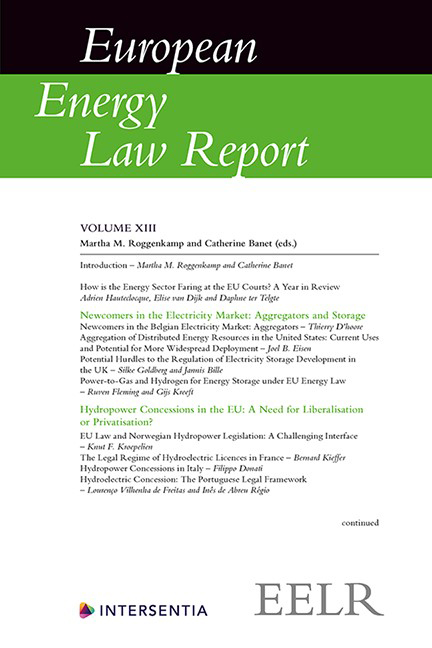Book contents
- Frontmatter
- Preface
- Contents
- List of Abbreviations
- List of Contributors
- Introduction
- Chapter I How is the Energy Sector Faring at the EU Courts? A Year in Review
- PART I NEWCOMERS IN THE ELECTRICITY MARKET: AGGREGATORS AND STORAGE
- PART II HYDROPOWER CONCESSIONS IN THE EU: A NEED FOR LIBERALISATION OR PRIVATISATION?
- PART III INVESTMENTS AND DISINVESTMENTS IN THE ENERGY SECTOR
- PART IV OFFSHORE DECOMMISSIONING IN THE NORTH SEA
- PART V CCS AS A CLIMATE TOOL: NORTH SEA PRACTICE
- PART VI FROM EU CLIMATE GOALS TO NATIONAL CLIMATE LAWS
Chapter II - Newcomers in the Belgian Electricity Market: Aggregators
Published online by Cambridge University Press: 30 April 2020
- Frontmatter
- Preface
- Contents
- List of Abbreviations
- List of Contributors
- Introduction
- Chapter I How is the Energy Sector Faring at the EU Courts? A Year in Review
- PART I NEWCOMERS IN THE ELECTRICITY MARKET: AGGREGATORS AND STORAGE
- PART II HYDROPOWER CONCESSIONS IN THE EU: A NEED FOR LIBERALISATION OR PRIVATISATION?
- PART III INVESTMENTS AND DISINVESTMENTS IN THE ENERGY SECTOR
- PART IV OFFSHORE DECOMMISSIONING IN THE NORTH SEA
- PART V CCS AS A CLIMATE TOOL: NORTH SEA PRACTICE
- PART VI FROM EU CLIMATE GOALS TO NATIONAL CLIMATE LAWS
Summary
INTRODUCTION
When reflecting on aggregators’ role as newcomers in the Belgian electricity market, every word in the title, not to mention the interrelations between these concepts, raises questions.
In the first place, there is the electricity market, which in the end is what this is all about. The electricity market today is the result of the liberalisation it experienced in recent times. Before the liberalisation of this market, the market often involved the supply of electricity by one or a few producers/ suppliers, often also operating the system or part of it, even if electricity was already recognised as a product subject to the rules of free movement. Customers could then get access to electricity at a negotiated or regulated price. Although electricity systems had been interconnected for a number of decades already, interconnections served the operational security requirements of the systems, whereas the markets were regulated at national level. The aim of liberalisation was to facilitate electricity trading across Europe through the adoption of harmonised rules, as this was needed for the creation of a free and competitive market. This liberalisation did not happen in isolation but went hand in hand with other policies, such as those relating to security of supply, promotion of renewable energy sources and energy efficiency. As a result, Belgium has become fully interconnected with its neighbouring countries and increasingly integrated into the regional market.
Secondly, we come to the aggregators, which are one kind of market player. Aggregators are a product of market liberalisation, closely related to the need to fulfil objectives of security of supply and energy efficiency. Of particular interest for this chapter is the interaction between aggregators and transmission system operators (TSOs), and the influence the latter can have on aggregators when proposing appropriate market rules for the compensation of quarter-hourly imbalances which are so vital for aggregators. As will be further explored, aggregators are becoming key players contributing to the electricity market efficiency as such as well as fulfilling TSOs’ needs in terms of balancing of the system.
Finally, this chapter is an opportunity to challenge the common impression: are aggregators really newcomers?
- Type
- Chapter
- Information
- European Energy Law Report XIII , pp. 35 - 56Publisher: IntersentiaPrint publication year: 2020

